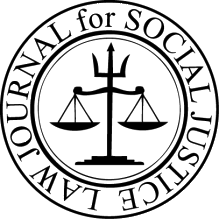Editor’s Note:
The summer of 2020 incentivized important conversations regarding social justice issues, with the death of George Floyd awakening fervent discussion as millions of people in the United States gathered to protest police brutality. During a time where the coronavirus pandemic created an unprecedented mantra of distancing, the nation managed to come together in the hopes of advocating for justness and equality. In the same spirit, Volume Fourteen brings attention to topical issues deserving redress.
First, in Eternal Punishment: The Cruel and Unusual Practice of Deporting Noncitizen Juvenile Offenders, Maya Reisman challenges the deportation of juveniles that have been criminally prosecuted in adult courts. After offering a thoughtful analysis as to why the practice of juvenile deportation should be considered a punishment subject to the limitations of the Eighth Amendment, Reisman concludes by advocating for a comprehensive agenda eliminating juvenile transfer to adult criminal court.
Livan Davidson continues to shed light on the institutional errors in our criminal justice system by examining how lenient statutes across the nation dictating law enforcement use of lethal force have enabled unjustified killings of civilians. In Peace Officers’ Lack of Peace: A Higher Standard of Care for Police Use of Lethal Force in Florida, Texas, and Other States, Davidson proposes stricter state laws will help alleviate improper officer training, suggesting that other states mirror their statutes to model the California Act to Save Lives.
Third, in A Compensation System for Gun Deaths and Injuries, Frank Vandall exposes the lack of meaningful gun control efforts and legislative solutions to end gun violence. In response, Vandall argues that victims of gun violence should be able to obtain some semblance of justice through the creation of a compensation system funded by the federal government, state governments, and the NLRA coupled with gun manufacturers.
Additionally, Allyce Bailey, Esq., provides a primer on implicit bias and explores the hidden race-based justifications offered to overcome a Batson Challenge. Bias Within Bias: How Washington General Rule 37 Addresses Disguised Racial Discrimination in Jury Selection and a Blueprint for Rule 37’s Nationwide Implementation in All American Courtrooms addresses why this issue unbalances the scales of justice in both criminal and civil litigation, applauds Washington General Rule 37 for its efficacy in addressing the issue, and urges for its nationwide implementation.
In Envirodemic: Unconstitutional Restrictions on Environmental Protests from the Attacks of 2001 to the Struggles of 2020, Benjamin Cramer dissects the anti-environmental protest statutes proposed and enacted by several states, as well as their historical and political influences. After considering how the statutes have avoided judicial review, the article discusses why the state laws should be reevaluated and rejected due to their constitutional violations.
Next, Alexander Medina’s Enforcement of Tribal Witness Subpoenas on Non-Indians: How the UCCJEA Provides for the Impossible, analyzes how a tribe’s sovereign immunity can be a weakness when needing to enforce subpoenas for testimony from Non-Indians. Medina then explores the ability of tribes to utilize the UCCJEA and other means of agreement between tribes and states to issue and enforce any necessary subpoenas for witness testimony in child custody proceedings.
Last, Judith Stinson, Tara Mospan, and Marnie Hodahkwen scrutinize how outsider distrust in the tribal court system creates a number of problems, including decreasing the effectiveness of tribal judicial systems, inhibiting tribal economic development, and ultimately undermining tribal sovereignty. After responding to critics of tribal court systems, Trusting Tribal Courts: More Lawyers is Not Always the Answer argues that non-lawyer judges and lay advocates can be as effective as law-trained judges and advocates in other court systems.
I would like to thank my Executive and Editorial Board for their hard work and support. Though our Journal had to continue its mission remotely, we managed to host our annual symposium in a virtual setting to discuss climate migration. Moderated by ASU Professor of Law Angela Banks, our symposium featured three speakers who spoke about climate change’s effect on immigration to the U.S. and the movement of peoples within the U.S. and around the globe. Although our world has not yet returned to a sense of complete normalcy, it remains important to amplify the voices of the underserved and underrepresented. The Law Journal for Social Justice thanks its authors for continuing to do so.
Julieta Carrillo 2020-2021 Editor-in-Chief
